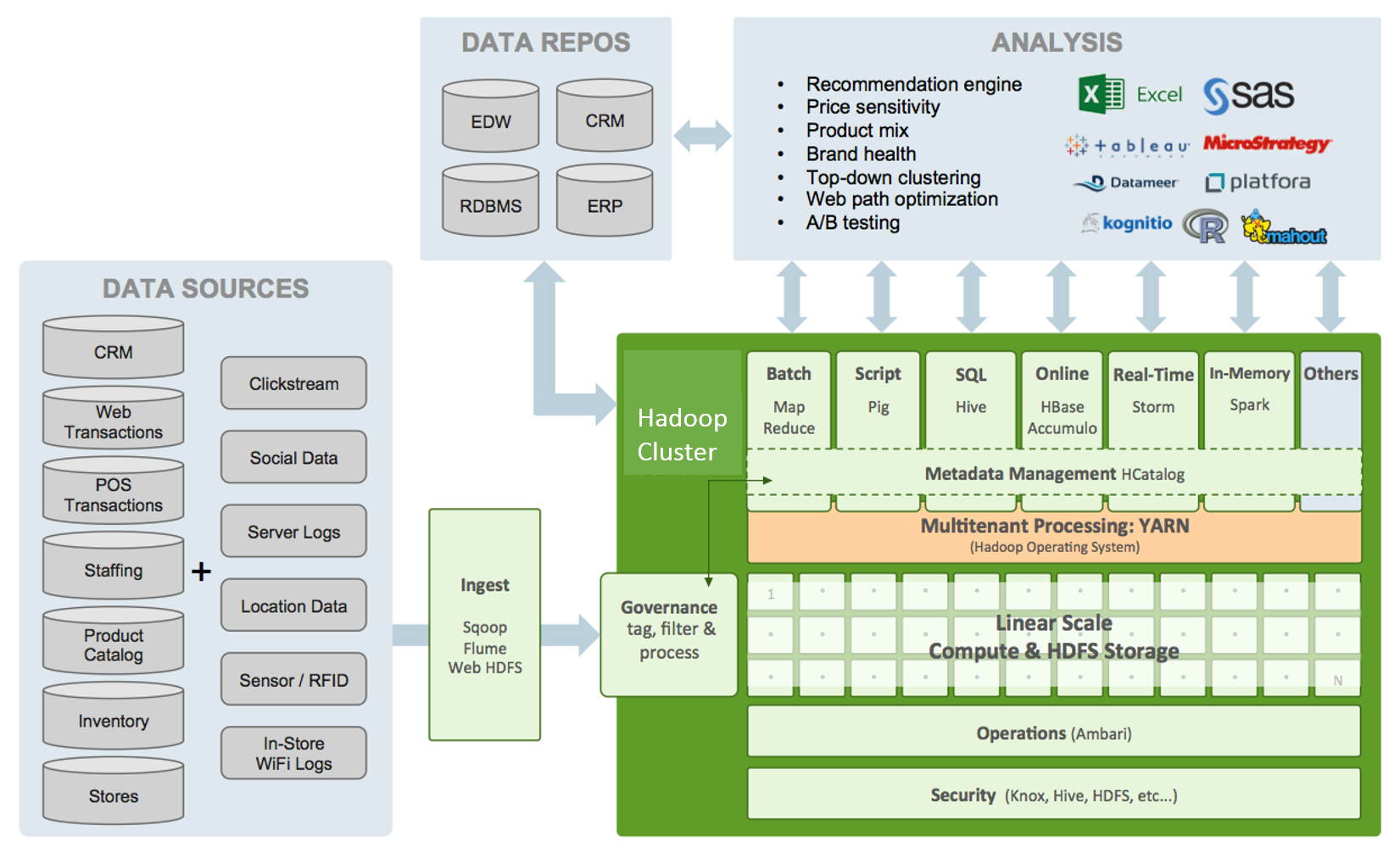June
24
2015
Big Data and Hadoop in Retail Domain
Published by BIWHIZ team
The Big Data revolution presents both challenges and opportunities to retailers.
Thanks to big data; retail companies can eliminate traditional upfront costs associated with real-estate, inventory and staffing.
The following are some of the examples where retailers are using big data to their advantage :
- Building a 360° view of customers
Retailers are improving customer satisfaction and sales opportunities by integrating all relevant customers across online transactions, POS transactions, social media and customer service interactions into one single vision.
Apache Hadoop gives retailers a 360° view of customer behavior. It lets them store data for longer duration, help in integrating with other data sets, and identify various phases of the customer life cycle. Better customer analytics helps in increasing sales, reduce inventory expenses and retain the best customers. - Analyzing a brand Sentiment
Retailers can analyze sentiment from Twitter, Facebook, LinkedIn, Blogs, Comment sections of news portals, or industry – specific social media streams. With better understanding of customer perceptions, they can align their communications, products and promotions with those perceptions. Apache Hadoop can store this streaming data and can enable quick, unbiased snapshots of brand opinions. - Localizing and Personalizing Promotions
Retailers that trace the location of their website subscribers can target them with their localized and personalized promotions. This requires correction with both historical and real-time streaming data.Apache Hadoop has the tools that can bring this and location data together to inexpensively localize and personalize promotions which can be delivered to mobile devices. Retailers can advertise by creating mobile apps to notify customers about local events and sales that align with their preference and geographic location. - Optimizing Websites
Retailers can increase their website traffic and revenue by analyzing consumer Clickstream. Hadoop can help retailers capture, analyze and gain actionable insights from data across multiple channels including search, ads, email and weblogs.
By Analyzing Clickstream they can better understand how customer make their purchasing decisions. Apache Hadoop can store all the web logs, for years, at a low cost. Web retailers use information in that data to understand user paths, do basket analysis, run A/B tests and prioritize sit updates. - Loyalty Program Benefits
Big Data increases the channel reach of the loyalty program benefits from the point of sale, web and call centers to mobile and social capabilities. This is possible because a customer profile on mobile and social media can be identified through big data analytics. - Fraud Detection
Retail Fraud can range from fraud in returns or abuse in consumer service or credit risk for larger purchases. It can also be major security breach putting private customer information at risk. Retailers need to protect their margins and their reputations by proactively detecting fraudulent activities. Hadoop can help retailers identify anomalies and patterns by putting in place continuous monitoring tactics that look for unusual patterns in product and inventory movement.
For example, it can identify shrink and store theft events. Over time, models can be built that utilize machine learning and provide more predictive capabilities that can trigger actions when these events are encountered. - Optimizing Store Layouts
For example, it can identify shrink and store theft events. Over time, models can be built that utilize machine learning and provide more predictive capabilities that can trigger actions when these events are encountered.
Apache Hadoop can store this huge volume of unstructured sensor and location data. Once analyzed, the resulting intelligence allows retailers to reduce costs and simultaneously improve customer in-store satisfaction. This improves same-store sales and customer loyalty. - Merchandising and Supply Chain Analysis
Apache Hadoop can store this huge volume of unstructured sensor and location data. Once analyzed, the resulting intelligence allows retailers to reduce costs and simultaneously improve customer in-store satisfaction. This improves same-store sales and customer loyalty.
Today’s leading retailers are leveraging Big Data to capture store-level transaction data over long periods of history to drive more accurate merchandising and supply chain decisions at the store level.



Comments
comments powered by Disqus